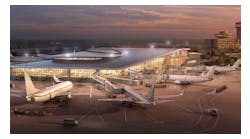San Antonio International is First Airport in the World to Purchase and Deploy Virus and Bacteria Defeating Xenex LightStrike Robot
San Antonio International Airport (SAT) is the first airport in the world to purchase and employ the Xenex LightStrike robot — the only ultraviolet (UV) room disinfection technology proven to deactivate SARS-CoV-2 — the virus that causes COVID-19.
“The health and safety of our employees and passengers has always been our number-one priority,” said Jesus Saenz, Jr., director of airports for the City of San Antonio. “The acquisition of the Xenex LightStrike robot is just the latest innovative enhancement to our daily operations and efforts to ensure that traveling through San Antonio International Airport is the easiest and safest experience passengers can encounter.”
The LightStrike robot incorporates cutting-edge technology through bursts of intense UV light to destroy hard-to-kill viruses and bacteria found in common places and hard-to-clean spaces. SAT is the first airport to deploy LightStrike robot technology from Xenex — a renowned world-leader in infection prevention and disinfection technology. LightStrike technology is used in healthcare facilities to destroy microscopic pathogens often found on high-touch surfaces that can cause healthcare associated infections. In testing performed at the Texas Biomedical Research Institute — one of the world’s leading independent research institutes working exclusively on infectious disease — the LightStrike robot destroyed SARS-CoV-2, the virus that causes COVID-19, in two minutes. SAT is now bringing this same level of disinfection to the commercial airport industry.
“COVID-19 nearly caused the aviation industry to stop in its tracks,” said Dr. Mark Stibich, chief scientific officer and co-founder of Xenex. “Planning for the disinfection of public spaces — especially commercial airports — is a major priority to reduce the risk of disease transmission. Putting an effective infection prevention infrastructure in place is essential, and we are proud to partner with San Antonio International Airport in leading the aviation industry in this effort.”
Using environmentally-friendly pulsed xenon, the portable LightStrike can disinfect an area in less than 10-15 minutes without warm-up or cool-down time. This will allow the quick and easy deployment of the LightStrike robot to disinfect high-traffic areas without a disruption to passengers. Operated by the airport’s terminal services staff, it can be used anywhere in the airport — to include jet bridges, gate areas, ticketing counters, baggage claim, concessions, elevators and restrooms — where there are high-touch surfaces or high volumes of traffic.
In 2012, the city of San Antonio recruited Xenex’s headquarters and manufacturing operations from Austin to San Antonio. Since that time, and with the city’s support, Xenex has continued to grow and has established itself as a world-leader in mobile, UV disinfection technology. “I am excited to see the use of innovative technology at the airport to address the ever-evolving challenges in the fight against COVID-19 and other infectious diseases,” said Mayor Ron Nirenberg. “Our aviation team’s forward-looking moves, such as using this UV disinfection technology and partnering with San Antonio-based Xenex, will position our city well for economic growth now and in the years to come.”
“Our goal is to provide the safest environment for our passengers. We already have a comprehensive sanitization and disinfection process in place,” said Saenz. “We are excited to add the LightStrike to our current health enhancements to complement our sanitation stations, social distancing measures and other safety protocols. We are proud to be a leader in the aviation industry when it comes to health and safety, and to be the first airport to employ the LightStrike.”
The airport plans to hold a city-wide naming contest to name the LightStrike Robot. The naming contest will be a part of the airport’s social media efforts designed to restore consumer confidence in commercial air travel and reduce fears of contracting COVID-19 while at the airport.


